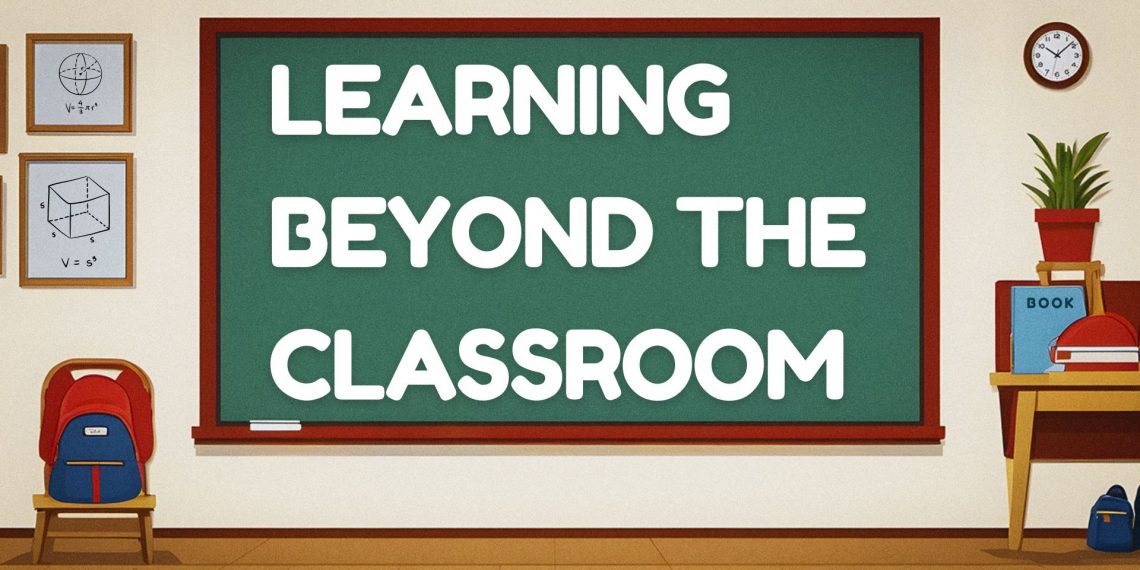What Is Learning Outside The Classroom?
As a time of excessive information loading and an era of rapid technological development, traditional classroom learning has undergone a thorough transformation that reflects on its content, methods as well as means of data conveyance. Textbooks and lectures have always been the backbone of the architecture of knowledge acquisition. Therefore, with the knowledge of the significant role everyday moments play in developing balanced individuals geared up for tomorrow’s difficulties, educators and learners are waking up to these realities
Whether it is from volunteering, field trips, winter shadowing, or apprenticeships, the variety of options gives students enough space to escape the four walls of the classroom and experience their education in a more real and hands-on way. These experiences apart from providing a complementing aspect to theoretical learning also equip students with some of the above-mentioned qualities which are necessary in today’s world that is full of complexities.
Advantages And Disadvantages Of Learning Outside The Classroom
The benefits of being outside the classroom are universal practical experience which helps to address the gap between theory and application, bringing more understanding in students. It is responsible for developing and nurturing such key skills as problem-solving, adaptability, teamwork, and formation of engagement and motivation by connecting the learning process to real-world settings. In addition to that, it develops the inner side of one, strengthens resilience, and gives a wider view of the world.
Problems with logistics, difficulties in ensuring security, and risky situations can appear. It also supplies opportunities for costs and resources to be squandered or versioned. Schools with resources that exceed what was allocated to pay for and maintain themselves are privileged to offer students more than some schools without such privileges may. Besides, the quality and educational aspects of these experiences and courses may vary greatly if oversight or neat organization is not ensured.
By far, the most remarkable perk of practical learning is its ability to serve as the bridge between theory and reality. The most vicarious ideas and the disjointed pieces that usually get lost in the classroom become real and connected in real-world scenarios. One may illustrate this, for instance, by citing the experience as a student doing environmental studies who reaches a deeper understanding of ecological principles through participating in conservation or going on expeditions to collect field data in natural habitats. Likewise, an entrepreneur-to-be can be well equipped with corporate management know-how through an internship at a startup, and this provides a first-hand experience on the trapping and potential that comes with running a business.
Additionally, living experiences teach learners to discover the world on their own and internalize the desire to learn, which is later reflected in their performance. If students are buckled in to work on projects they are intrinsically motivated which in turn they feel good about their learning and learners will keep on pursuing the new endeavors. Whether it’s visiting a historical landmark, doing a science experiment, or volunteering to solve social issues, one’s interest grows, creativity is sparked, and the practice of education starts to be seen as a natural thing.
Besides academic progress, skills-based learning cultivates personalities and emotional improvement too. The fact that you go beyond your comfort level and adapt to unawanting problems makes you able to sustain and handle difficult situations. Failure ceases to be a shameful thing and becomes only a door to personal growth and insight which extension will help students to traverse difficulties and setbacks. Lastly, the process of interacting with people from various backgrounds cultivates empathy, sensitivity, and cultural knowledge allowing individuals to travel around the world more consciously and smoothly.
In an environment where the workplace is becoming more and more fast-paced, employers are demanding employees with skills beyond just technical competence and must also possess academic as well as practical skills and real-world experience. By undertaking experiential learning, graduates are empowered with the competency that enables them to showcase their skills of practicality and logic to solve real-world puzzles. Internships, cooperative programs, and internships with projects have the function of a bridge, which connects students to the working environment, helps them to create links with colleagues and employers, gain the vision of what career they like, and develop and practice transferable skills that are necessary for every workplace.
To make the most of real-world learning experiences, educators are in charge of developing new teaching methods that will engage students into experiencing learning to become part of the curriculum. Some of the strategies such as project-based assignments, case studies, simulations, and also community partnerships could help the faculty add edge and flavor to the traditional classroom lessons and offer students a chance to professionally application of what is learned in class.
Moreover, the relationship between the college and the industry, nonprofits, and the public should be enhanced to create internships, mentorship programs, and experiential learning initiatives. Through building reciprocal partnerships, students can receive skill development leading to different career paths that match their academic goals. There is a difference between learning inside and outside the classroom which is very imperative to understand.
After all, authentic learning could be the means to achieving the most enjoyable and all-rounded education and at the same time empowering the future generation to face all kinds of challenges. Through experiential learning inside the classroom and outside the class, educators are helping students to become for all of their future lives, knowledgeable, analytical, and responsible persons whose task is to tackle these challenges of the future. In terms of the future of education, let us grab the chance to harness the power of on-the-job experience not only for the development of the next leaders but also for the rising innovators and advocates.




